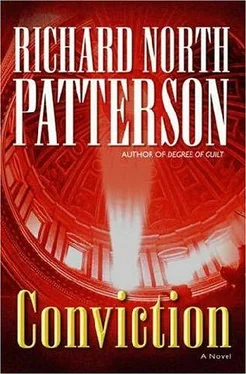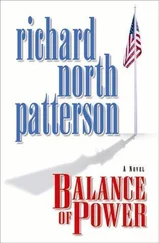Richard Patterson - Conviction
Здесь есть возможность читать онлайн «Richard Patterson - Conviction» весь текст электронной книги совершенно бесплатно (целиком полную версию без сокращений). В некоторых случаях можно слушать аудио, скачать через торрент в формате fb2 и присутствует краткое содержание. Жанр: Старинная литература, на английском языке. Описание произведения, (предисловие) а так же отзывы посетителей доступны на портале библиотеки ЛибКат.
- Название:Conviction
- Автор:
- Жанр:
- Год:неизвестен
- ISBN:нет данных
- Рейтинг книги:3 / 5. Голосов: 1
-
Избранное:Добавить в избранное
- Отзывы:
-
Ваша оценка:
- 60
- 1
- 2
- 3
- 4
- 5
Conviction: краткое содержание, описание и аннотация
Предлагаем к чтению аннотацию, описание, краткое содержание или предисловие (зависит от того, что написал сам автор книги «Conviction»). Если вы не нашли необходимую информацию о книге — напишите в комментариях, мы постараемся отыскать её.
Conviction — читать онлайн бесплатно полную книгу (весь текст) целиком
Ниже представлен текст книги, разбитый по страницам. Система сохранения места последней прочитанной страницы, позволяет с удобством читать онлайн бесплатно книгу «Conviction», без необходимости каждый раз заново искать на чём Вы остановились. Поставьте закладку, и сможете в любой момент перейти на страницу, на которой закончили чтение.
Интервал:
Закладка:
"A year before Rennell's trial, the U.S. Supreme Court ruled that death-qualified juries don't violate a defendant's right to an impartial jury drawn from a fair cross section of the community. That's another way the death penalty warped Rennell's trial—Mauriani got to pick a jury more likely to convict him."
"You don't suppose," Carlo suggested, "that crossed Mauriani's mind when he decided to seek the death penalty."
Terri nodded. "In a city this liberal, you can knock out a slew of jurors. But, in retrospect, he thinks any twelve people off the street would have sentenced Rennell to death."
"Because his case was that good?"
Terri put down her cup. "Partly that," she answered. "Partly James. And partly because, in Mauriani's colorful phrase, the jury found Rennell Price 'guilty of offensive smiling.' "
* * *
Mauriani first noticed Rennell during Yancey James's disastrous cross-examination of Thuy Sen's mother.
The prosecutor's decision to lead with Chou Sen was simple—of the two parents, she was the more emotive, and only she had even a limited command of English. Gently, on direct, Mauriani had led her through the tragedies that had brought the Sen family to this moment: the murder of Thuy Sen's maternal grandmother and grandfather by the Khmer Rouge; the disappearance of Chou's brother and two sisters; the desperate flight through Vietnam of Meng and Chou—pregnant with Thuy Sen—and their three-year-old daughter, Kim; their harrowing voyage to Thailand on a boat which smuggled refugees in return for what little money the Sens had left; Thuy's birth in a refugee camp; their dream of reaching safety in America. The next minutes were spent recalling the sweetness and docility of the victim, helping the jury to see her. And then, through questions Mauriani found difficult to ask, and Chou Sen harder to answer, they evoked the two agonizing days between Thuy Sen's disappearance and the moment her parents next saw her—a bloated corpse viewed through a window—and learned how she had died.
Mauriani had an eye for swing jurors, and he had picked out three to watch—the businesslike accountant whom he guessed would become the foreman; the Latina waitress with the expressive eyes and placid manner; and the no-nonsense black day-care worker. His questioning completed, Mauriani glanced at them as he returned to the prosecution table.
The accountant, Henry Feldt, was intently watching Yancey James approach the witness. Anna Velez gazed at Meng Sen, sitting with his head bowed in mute anguish. But the day-care worker, Candace Bender, was studying the defendants.
He followed her gaze. Payton Price showed little emotion—only a narrowing of his eyes, a stiffness in the way he sat, betrayed his tension. Rennell was different. Sitting back in his chair with folded arms, he appeared either to be asleep, or to be dismissing Chou Sen and her heartache as unworthy of his attention.
As his clients' instructor in decorum, Mauriani thought, Yancey James left something to be desired. Dressing them in suit and tie would not be enough to overcome a demeanor like Rennell's—when Mauriani looked back at Candace Bender, she was staring at Rennell Price with her lips pressed tight.
James, it seemed at once, would be no help to his clients. After introducing himself to the witness, he asked bluntly, "Your daughter left school alone that day, didn't she?"
Chou Sen nodded her head in sorrow. "Yes."
Even this one-word answer seemed to drain her. In James's position, Mauriani thought, he would get her off the stand as quickly as he could, then go after the other, less sympathetic witnesses, who had actual evidence to offer. Mauriani had already accomplished his mission in leading with Chou Sen—creating sympathy while bringing Thuy Sen to life—and Clarence Darrow reincarnate could not undo the damage.
But James seemed not to know this. His only concession to this woman's tragedy was to mute his accustomed grandiloquence, as though this might disguise the offensiveness of his questions. "And why," he prodded, "was Thuy alone?"
Chou Sen clasped her hands together. "She stayed after school. For extra help from the teacher. Her sister, Kim, didn't wait."
"Did you tell Kim to wait?"
"No." Briefly Chou's eyes closed. "I thought she knew."
Could it be, Mauriani wondered in astonishment, that James would actually try to impugn the victim's family? "But when Kim came home alone," James continued, "you knew Thuy also would be walking alone. Did you go to the school?"
"No."
"Why not?"
Chou hesitated. "I eat bad fish the night before. Bad stomach."
In fact, Mauriani knew, Chou had suffered vomiting and diarrhea so debilitating that she could hardly get out of bed. He had not brought this out on direct; he had not imagined where James was going now.
Briefly, the lawyer dabbed his nose. "Bad stomach," he repeated skeptically. "Did you send Kim back to look for her?"
"No. Didn't want her to go back alone."
"Or your husband?"
Chou glanced toward Meng. "Not home."
"So you decided to let your nine-year-old daughter walk home by herself."
"Yes." Chou's voice was soft with misery. "Alone."
"How many blocks is it from school to home?"
Chou shook her head. "Don't know."
"Sixteen blocks, Mrs. Sen. Do you know what goes on in sixteen blocks in the Bayview District?"
Out of compassion for Chou Sen, Mauriani considered objecting, then decided not to disrupt her antagonist's suicide-in-progress. "What you mean?" she asked.
"Do you know that some young girls in the Bayview start trading sex for cocaine?"
Chou swallowed. "Don't know."
"You don't know? You live in the Bayview for seven years, and claim not to know of the dangers Thuy Sen might fall prey to?"
"Don't know," Chou repeated stubbornly.
James moved closer. "So you don't know," he asked with insinuating quiet, "whether Thuy decided to visit with some young men, maybe listen to music."
Mauriani experienced an emotion close to awe: James's miscalculation was attaining a grandeur all its own. The accountant, Henry Feldt, watched the lawyer with a grimness that betrayed his anger.
"Thuy not like that," her mother insisted.
Her resistance seemed to fuel James's lack of judgment; he drew himself up straighter, and his tone grew more aggressive. "How did you know, Mrs. Sen, how Thuy might react when she was on her own?"
Chou Sen looked bewildered by the question. "Thuy Sen good girl," she said plaintively.
"Even a good girl," James pressed on, "can sometimes be led astray. You just don't know who she might have fallen in with, do you? Or what distraction she might have found on any one of those sixteen blocks you let her walk alone."
Mute, Chou Sen hung her head. In her miserable silence, Mauriani glanced at the day-care worker. To his surprise, Bender's silent fury was focused not on Yancey James but on Rennell.
He was smiling at his grandmother. Sitting in the front row, she wore a more appropriate expression—mortification at Yancey James's questions. But when Eula Price turned to him, Rennell's smile only broadened.
* * *
After James's abuse of Chou Sen, Mauriani thought, his own crisp examination of Flora Lewis was the perfect counter.
Yes, Lewis said with certainty, she had seen Rennell pull the frightened girl off the sidewalk. Yes, it was Payton who closed the door behind them. After all these years living across the street, she knew those brothers as well as she knew her own hand. And no person of feeling could ever forget Thuy Sen, stumbling as Rennell pulled her inside.
Standing to cross-examine, James got right to work. "How do you feel about blacks?" he asked.
Lewis stiffened. "Depends on the individual."
"Really? Well you sure didn't like these black men, did you? Long before Thuy Sen disappeared, you called the police on them."
Читать дальшеИнтервал:
Закладка:
Похожие книги на «Conviction»
Представляем Вашему вниманию похожие книги на «Conviction» списком для выбора. Мы отобрали схожую по названию и смыслу литературу в надежде предоставить читателям больше вариантов отыскать новые, интересные, ещё непрочитанные произведения.
Обсуждение, отзывы о книге «Conviction» и просто собственные мнения читателей. Оставьте ваши комментарии, напишите, что Вы думаете о произведении, его смысле или главных героях. Укажите что конкретно понравилось, а что нет, и почему Вы так считаете.












